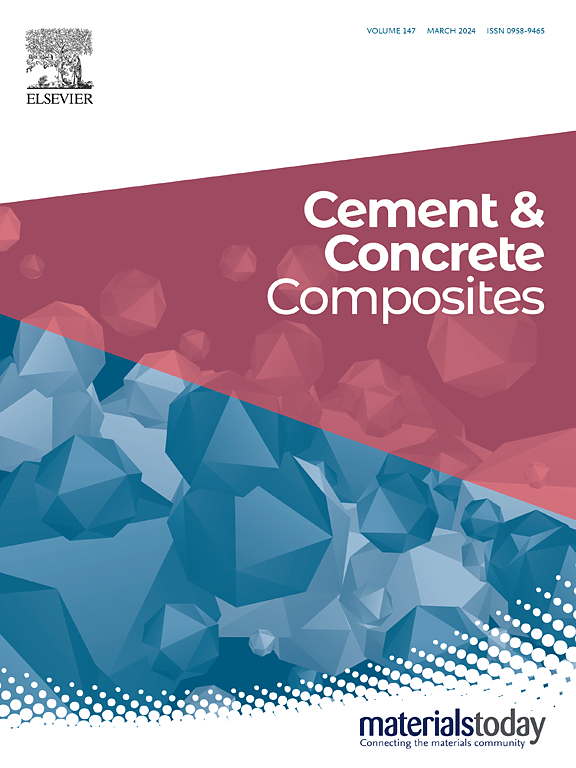Microstructure transformation of MCM-41 modified cement paste subjected to thermal load and modelling of its pore size distribution
IF 13.1
1区 工程技术
Q1 CONSTRUCTION & BUILDING TECHNOLOGY
引用次数: 0
Abstract
This study examines the effects of highly reactive, mesoporous MCM-41 silica on the thermal resistance and microstructural stability of Portland cement paste (CP). The motivation is to enhance cement composites (CC) properties using supplementary cementitious materials (SCMs), addressing environmental challenges from global cement production. The research involved modifying CP with 0–2 wt% MCM-41 and subjecting it to thermal loads from 20 °C to 700 °C. Evaluations included compressive and tensile strengths, density, water absorption, and shrinkage. Characterization techniques like X-ray diffraction (XRD) and mercury intrusion porosimetry (MIP) analysed phase composition and pore distribution. Results showed that MCM-41 significantly improved compressive strength, with a 26.9 % increase at 0.75 wt% content. Tensile strength also improved up to 33.8 % for 0.25–1 wt% MCM-41 content. Thermal stability tests indicated enhanced performance in the 200–500 °C range by reducing microcrack formation. XRD analysis revealed that MCM-41 influenced the phase composition, particularly delaying the thermal decomposition of portlandite and enhancing the stability of calcium silicate hydrates (CSH). Microstructural analysis revealed a denser, more cohesive cement matrix with reduced water absorption and shrinkage, enhancing durability. Additionally, MIP studies showed that MCM-41 contributed to a finer pore structure, improving the overall mechanical properties despite increased porosity. To supplement the findings, peak models have been tested to assess the ability to numerically predict pore size distribution of thermally loaded CP. Thus, MCM-41 is effective for improving the thermal and mechanical properties of CP, offering potential for applications in thermally stressed environments, contributing to more sustainable construction materials.
MCM-41改性水泥浆体在热载荷作用下的微观结构变化及孔径分布建模
本研究考察了高活性、介孔的MCM-41二氧化硅对硅酸盐水泥浆(CP)的耐热性和微观结构稳定性的影响。其动机是使用补充胶凝材料(scm)来提高水泥复合材料(CC)的性能,解决全球水泥生产带来的环境挑战。研究包括用0-2 wt.%的MCM-41修饰CP,并使其承受20°C至700°C的热负荷。评估包括抗压和抗拉强度、密度、吸水率和收缩率。表征技术如x射线衍射(XRD)和汞侵入孔隙测定(MIP)分析了相组成和孔隙分布。结果表明,MCM-41在0.75 wt.%的添加量下,抗压强度提高了26.9%。当MCM-41含量为0.25-1 wt.%时,抗拉强度也提高了33.8%。热稳定性测试表明,通过减少微裂纹的形成,在200-500°C范围内提高了性能。XRD分析表明,MCM-41对相组成有一定的影响,特别是延缓了硅酸盐的热分解,增强了硅酸钙水合物(CSH)的稳定性。微观结构分析表明,水泥基质密度更大,黏结性更强,吸水率和收缩率降低,耐久性提高。此外,MIP研究表明,MCM-41有助于更精细的孔隙结构,尽管孔隙度增加,但整体力学性能得到改善。为了补充研究结果,测试了峰值模型,以评估数值预测热载荷CP的孔径分布的能力。因此,MCM-41可以有效改善CP的热性能和力学性能,为热应力环境中的应用提供了潜力,为更可持续的建筑材料做出贡献。
本文章由计算机程序翻译,如有差异,请以英文原文为准。
求助全文
约1分钟内获得全文
求助全文
来源期刊

Cement & concrete composites
工程技术-材料科学:复合
CiteScore
18.70
自引率
11.40%
发文量
459
审稿时长
65 days
期刊介绍:
Cement & concrete composites focuses on advancements in cement-concrete composite technology and the production, use, and performance of cement-based construction materials. It covers a wide range of materials, including fiber-reinforced composites, polymer composites, ferrocement, and those incorporating special aggregates or waste materials. Major themes include microstructure, material properties, testing, durability, mechanics, modeling, design, fabrication, and practical applications. The journal welcomes papers on structural behavior, field studies, repair and maintenance, serviceability, and sustainability. It aims to enhance understanding, provide a platform for unconventional materials, promote low-cost energy-saving materials, and bridge the gap between materials science, engineering, and construction. Special issues on emerging topics are also published to encourage collaboration between materials scientists, engineers, designers, and fabricators.
 求助内容:
求助内容: 应助结果提醒方式:
应助结果提醒方式:


